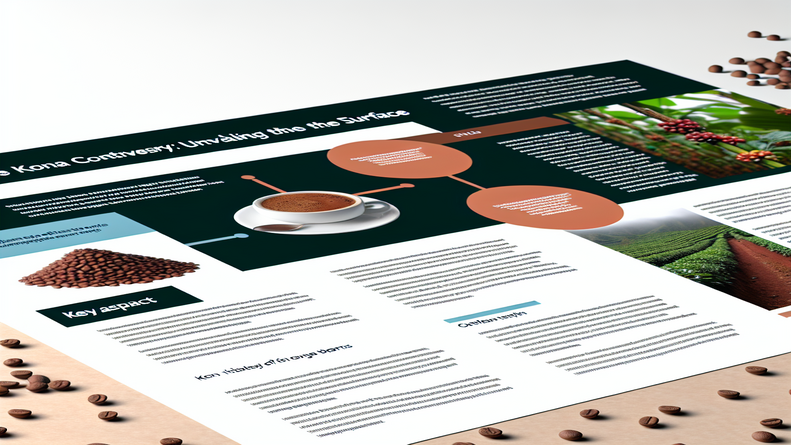![]()
Imagine living in a world where coffee is not just a warming cup of comfort but a significant player in a legal battle fraught with intrigue and complexity. This is the world of Kona coffee farmers, navigating the rough terrain of commerce where authenticity clashes with profiteering, like tectonic plates in a geological conundrum. These coffee aficionados aren’t just cultivating a crop; they’re defending a legacy against the misuse of their treasured name. Can these stalwart defenders of true Kona coffee use a method from the rocky realm of geology to champion their cause and secure their rightful earnings? Let’s explore the gripping tale of their innovative strategy and the lessons it holds.
The Origins of Authenticity: The Kona Coffee Legacy
The rich volcanic soil of Hawaii’s Kona district is a treasure trove for coffee connoisseurs. This paradisiacal region delivers beans that are as uniquely robust in flavor as they are delicate in aroma—creating the famed Kona coffee. Indigenous to this vibrant landscape, Kona coffee farmers have long prized their crop for its distinctive quality, which is deeply intertwined with the geography, climate, and very soul of the land. With each harvest, they uphold a tradition that is as much about cultural heritage as it is about agriculture.
However, even in this idyllic setting, shadows loom. The value of the Kona name has attracted entities eager to capitalize on its reputation, leading to the widespread sale of blends that contain only a fraction of real Kona beans. This dilution of the brand was not just an affront to the farmers’ hard work but also a deceptive practice for consumers seeking authenticity.
The Geological Innovator: Uncovering Deception with Science
In a remarkable parallel to the painstaking work of geologists who delve into the earth’s crust to uncover its secrets, the Kona coffee farmers turned to science to defend their produce—and their livelihoods. Recognizing that each layer of soil carries a unique fingerprint, they borrowed a method typically used in geology to authenticate the origin of their coffee.
Isotope ratio mass spectrometry (IRMS), a technique adept at unraveling the isotopic signatures that signify the history and composition of geological samples, would become their litmus test. By analyzing the carbon, nitrogen, and oxygen isotopic ratios in their coffee beans, the Kona crusaders could prove, with irrefutable scientific evidence, the genuine origin of their crop.
The Legal Brew: A Cup of Justice for Kona Farmers
Armed with their geological ally, the Kona coffee farmers embarked on a judicial journey to clamp down on the misuse of their prestigious name. Through legal avenues, they challenged retailers and distributors who were misleading consumers with labels suggesting a Kona pedigree for their markedly inferior products. The heart of their lawsuit lay in the untainted truth revealed by the IRMS test—solid, scientific proof of the beans’ provenance.
As the legal battle brewed, it steamed open a larger conversation about agricultural authenticity and the rights of regional producers. The compelling evidence presented sent a clear message: the integrity of Kona coffee, and by extension, any geographically protected product, was not to be trifled with.
The Echoes of the Kona Case: A Ripple Effect in Commerce
The repercussions of the Kona coffee case rippled far beyond the shores of Hawaii. It brought to light the importance of rigorous testing and truthful labeling in the marketing of regional specialties. Consumers were educated on the depth of research and the lengths that true producers go to in ensuring an authentic experience. This case became a beacon for producers of other geographically-specific goods to defend their legacy against the murky waters of misleading representation.
Farmers and producers of other niche products began looking to the Kona coffee farmers’ model as an inspiration to fortify their own claims to authenticity. A movement was sparked—a seismic shift towards transparency in the commerce of specialty goods.
The Kona Lesson: A Blueprint for Future Cultivators
The story of Kona coffee farmers is more than just a chapter in legal textbooks; it’s a masterclass for future cultivators in any industry. It underlines the value of proving the integrity of your product and protecting it against dilution and deception. It showcases the power of embracing science for authentication and the importance of educating consumers on the true worth of authenticity.
For farmers, producers, and entrepreneurs, the Kona case offers a blueprint. It demonstrates that when tradition meets science, and tenacity meets the law, even the mightiest mountains of marketplace deception can be moved.
The Verdict as a Vindicator: Empowering Honest Trade
In the courtrooms, the verdict vindicated the Kona coffee farmers. This victory was not just a triumph for them but a win for honest trade everywhere. It set a precedent, echoed in the clinking of coffee cups around the world, for the value of authenticity in commerce. It reaffirmed the notion that uniqueness, linked intricately with origin, can and should be defended zealously.
As the dust settled on the legal battles, the Kona label emerged untarnished, ready to be associated once again exclusively with premium coffee appreciated in its purest form. It was a cup filled to the brim with the essence of genuine Kona, savored all the more deeply for the struggle it underlined.Are you ready to join the movement and redefine the scope of what’s possible within your organization? Connect with me on LinkedIn to explore how you can harness the power of innovative validation methods and embark on a journey of unparalleled authenticity and productivity. Together, we will stand for the true value of origin in every product, every service, and every customer experience. 🚀🌟
